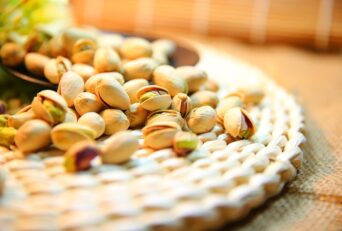L-tryptophan is a precursor of serotonin. It is an essential amino acid that you need to take in your diets. It is found in many foods such as poultry and animal meats. L-tryptophan is converted into melatonin and serotonin in your body.
Along with foods, l-tryptophan supplements are also available. Tryptophan gets converted into 5-Hydroxytryptophan (5-HTP) and then to serotonin.Serotonin plays an important role in various metabolic activities. L-tryptophan has numerous effects on your body. It improves your sleep and reduces depression.
You often neglect the importance of nutritional diet. You should know the importance of including protein foods in your diet. Your body cannot synthesize some amino acids that are essential for your health.
You must take them through your diet. Some essential amino acids are histidine, lysine, and leucine. Essential amino acids are important for building muscle tissues, brain, and various functions.
Tryptophan is one of these essential amino acids. So, what are the foods that contain tryptophan? go through the article to find out its sources and functions.
Table of Contents
Foods High In Tryptophan
1. Poultry
Turkey is the most well-known source of tryptophan. However, all the animal proteins contain some amino acids. A 4-ounce portion of turkey breast contains 350 to 390 mg of L-tryptophan.
Similarly, chicken also contains this much of L-tryptophan. Red meats also contain this amino acid. But red meats are high in saturated fats which can increase your cholesterol levels.
2. Seafood
Shrimp is the most nutritional source of L-tryptophan. It provides 330mg of tryptophan per 4-ounce serving. Fishes also contain significant amounts of tryptophan. They provide you about 250 to 400 mg of tryptophan per serving. These include:
- Tuna
- Salmon
- Sardines
- Cod
- Scallops
- Halibut
3. Dairy Products
Dairy products also contain tryptophan. However, they have a low amount of tryptophan than the meats and fishes. But that does not mean you should only consume meats or fishes.
Dairy products like cheese, yogurt, or milk contain this essential amino acid. Also, they provide you with calcium that builds your bone health.
Reduced fat cow’s milk provides 100mg of the amino acid per 1 cup serving. On the other hand, 1 cup of low-fat yogurt provides 60mg.
4. Nuts And Seeds
Nuts and seeds are also good sources to supplement your tryptophan intake. It is a very convenient way when you don’t have much time. Pumpkin is the most widely grown foods worldwide.
Pumpkin is a fruit that is very high in antioxidants and vitamins. Pumpkin seeds provide 110mg per one-fourth cup of serving. Sunflower seeds, cashews, and almonds provide 50mg per one-fourth serving.
Walnuts are not only delicious but also increase your intellectuality. Isn’t it wonderful? Walnuts are richest in polyunsaturated fats that the other nuts. It is very high in omega-6 fatty acid known as linoleic acid.
Omega-3 fats are also abundant in walnuts. Walnuts are known to reduce bad cholesterol levels and improve metabolism. They also help control your diabetes. The high amount of tryptophan may be responsible for intellectuality. Walnuts contain 0.10g per ounce.
5. Soy
The soybean is a member of the legume family. Soybeans are a wonderful source of proteins. It is the only vegetable that is a complete protein. Apart from this, they are also an excellent source of vitamin K, calcium, iron, magnesium, and fibre.
Soybean can also lower your blood cholesterol level. Soybeans are a great source of L-tryptophan. It provides you about 48mg per ounce.
6. Wheat
Wheat is a staple food for many people. It is popular as a staple food worldwide. Some people are also allergic to wheat because it contains gluten.
But for those lucky and tolerant people, wheat is an amazing source of amino acids. Wheat contains 11mg of tryptophan per ounce.
7. Potato
Potato is a good source of vitamin B6, potassium, and vitamin C. It is also high in dietary fibre. Potato is the most common vegetable in the world.
Potatoes are also rich in phytonutrients that work as antioxidants. Along with this, potatoes also contain tryptophan. They provide 8mg per ounce.
8. Cauliflower
Cauliflower contains about 77% of recommended vitamin C. People are not aware of its nutritional value. Cauliflower is a good source of proteins, potassium, and fibre.
Cauliflower belongs to the cruciferous family of vegetables. Cauliflower contains many essential amino acids including tryptophan. It provides 250 mg of tryptophan per ounce.
9. Cucumber
Cucumbers are the 4th most cultivated vegetable in the world. It has so many applications rather than being just a vegetable. Cucumbers are a great source of molybdenum, potassium, and vitamin K.
Cucumber contains silica i.e. the nail promoting mineral. Oh, ladies, you got another reason to love cucumbers. However, it has slightly low amounts of tryptophan than the other foods. It gives you 1 mg of tryptophan per ounce.
10. Mushrooms
Are you aware of the fact that mushrooms produce vitamin D when exposed to light? Some mushrooms also contain selenium that is healthy for our livers. Mushrooms also boost your immunity as they are highly enriched in antioxidants.
They also contain vitamin B2 and B3. Along with these nutrients, they contain tryptophan. Mushrooms provide 25mg of tryptophan per ounce. The amount is slightly low but you will get many other nutrients too.
11. Leafy Green Vegetables
Leafy greens are known for their antioxidant and anticancer properties. Leafy greens are low in fat and high in vitamin C and fibres.
They are also rich in phytochemicals. They can reduce the risk of developing cancer. In addition to this, they are good sources of tryptophan. Spinach contains 80 mg per ounce.
12. Tomatoes
Tomatoes are famous for their nutritional value. They are also high in antioxidants. Tomatoes are a great source of vitamin C and vitamin K. also, they are rich in tryptophan. They give you 1mg of L-tryptophan per ounce.
Can Tryptophan Help Anxiety?
Anxiety and stress affect your mental health. Tryptophan has a major role in your social functioning. It offers you protection against anxiety.
Not only anxiety, but tryptophan also helps in eliminating the symptoms related to stress.
Tryptophan is a precursor of serotonin that induces a response to stress. Tryptophan supplements have been known to reduce anxiety.
It inhibits the production of the biochemical markers of stress such as cortisol. L-tryptophan is converted into serotonin that controls your mood.
Some studies revealed that tryptophan supplements may work as antidepressants. 5HTP can also treat people with mild depression. Reduced intake of tryptophan leads to a low level of serotonin.
It thus leads to depression and anxiety. L-tryptophan can decrease mood swings, stress, tension, and restlessness.
Health Benefits Of Tryptophan
1. Recovery From Addictions
Tryptophan helps you overcome addictions. In order to quit smoking, you can take tryptophan supplements. Not only smoking, but you can kick off sugar cravings with tryptophan supplements.
2. Reduces Migraines
It also helps in reducing a migraine and headaches. Lack of tryptophan can worsen the pain associated with migraines and headaches.
Serotonin (the happiness hormone) offers you relief from symptoms of a migraine. It eliminates the migraine symptoms such as indigestion and pain.
3. Helps Maintain A Healthy Life
It promotes the release of growth hormones and suppresses your appetite. Tryptophan can help you in taking healthy diet and in weight loss. Serotonin relaxes your mind and helps in better metabolic functioning of your body.
4. Regulate Your Mood
Tryptophan is a natural mood lifter and prevents you from depression. It has been shown to promote happiness and a feeling of well-being.
5. Relieves Premenstrual Symptoms
Reduced levels of serotonin can cause dysphoria (state of uneasiness). Tryptophan depletion worsens the premenstrual symptoms. On the other hand, tryptophan supplementation may be effective in reducing symptoms.
6. Improve Physical Activity
Tryptophan helps you fight fatigue and improve your physical activity. It motivates you to be active and maintain fitness. Athletes often use tryptophan supplements to improve their performance. It is because it lowers your anxiety and stress levels.
7. Good Sleep
Tryptophan acts as a natural sedative and it lets you sleep better. Tryptophan supplements improve your sleep quality.
8. Consuming Tryptophan Can Help Treat The Following Disorders
- Sleep Disorders
- Depression And Anxiety
- A migraine And Tension Headaches
- Eating Disorders Like Anorexia
- Learning Disabilities Like ADHD
- PMS And Menopausal Symptoms
- Fibromyalgia
L-Tryptophan Dosage
The appropriate dosage depends on various factors. It depends on a person’s age, health and other conditions. It basically depends on the purpose of taking. However, some general dosages are given here such as:
- General Relaxation And Anxiety Reduction: 500-1000mg Daily
- Better Sleep: 250mg Every Day One Hour Before Bed
- Weight Loss: 1000-3000mg Every Day (Before Meals)
- Migraine Headaches: 300mg As Needed For Your Pain Relief (Do Not Take More Than 5000mg Per Day)
Why Is Tryptophan Needed In The Body?
Tryptophan is necessary for the production of vitamin B (niacin). Niacin is responsible to convert macromolecules into the energy form. Your body utilizes this energy for performing various functions.
Tryptophan is also a precursor of Auxin (phytohormone). It is also important for the brain to manufacture serotonin. Serotonin is a neurotransmitter that helps carries signals between nerve cells. It is the precursor of serotonin that transfers nerve impulses from one cell to another.
Serotonin is also responsible for good sleep. Tryptophan also protects you from depression and insomnia. Tryptophan is needed in children to control hyperactivity.
It is good for the regular functioning of the heart. It also helps you in weight loss by suppressing appetite. Tryptophan is needed in the body to balance hormonal levels naturally.
Tryptophan can also help the body fight various medical problems. Tryptophan supplements can help prevent steatohepatitis. It is a common liver disease. Tryptophan supplements can also improve symptoms in people with irritable bowel syndrome. Lack of tryptophan even worsens the condition.
Why Does Tryptophan Make You Sleepy?
You are not able to sleep if your mood is off. Depression, stress, and irritability are some of the causes of poor sleep quality. Serotonin and melatonin are responsible for a regular and healthy sleep. Both of them are made from tryptophan.
Tryptophan is thus a needed supplement for people who cannot sleep. 5-HTP is a byproduct of tryptophan. It acts on brain and CNS system and promotes a feeling of well-being.
A lack of good sleep can cause depression, declined motor coordination and reduced concentration. Tryptophan is a natural remedy to get good and normal sleep. Tryptophan has also been shown to decrease teeth grinding during sleep (bruxism).
Tryptophan also increases your alertness when you wake up. Unlike sleeping pills, it does not impair your performance. Also, it does make you dependent on itself for sleep.
Tryptophan is also associated with some complications such as obstructive sleep apnea. In this condition, your sleep cycles get disrupted. People with this condition are at a high risk to suffer from cardiovascular diseases.
What Are The Side Effects Of Tryptophan?
L-tryptophan can cause some side effects that are mentioned below:
- Heartburn
- Stomach Pain
- Belching And Gas
- Nausea
- Vomiting
- Loss Of Appetite
- Diarrhea
- A Headache
- Lightheadedness
- Dry Mouth
- Drowsiness
- Visual Blurring
- Sexual Problems
- Muscle Weakness
Precautions
1. Pregnancy And Breastfeeding
Do not take tryptophan supplements if you are pregnant or breastfeeding. It may be harmful to the fetus. Thus, it is unsafe during pregnancy and breastfeeding.
2. Eosinophilia
It can worsen the condition of eosinophilia. It is associated with the development of eosinophilia-myalgia syndrome (EMS).
3. Liver And Kidney Disorders
Tryptophan might worsen these conditions. Thus, avoid it if you are suffering from a liver or kidney disorder.
4. Antidepressants
Do not take it along with other depressants. It might increase serotonin too much. Excess of serotonin has many side effects like heart issues, anxiety, and shivering.
Some of these medications for depression include:
- Fluoxetine (Prozac)
- Paroxetine (Paxil)
- Sertraline (Zoloft)
- Amitriptyline (Elavil)
- Clomipramine (Anafranil)
Final Thoughts
As discussed in the article, tryptophan has a number of benefits. It can affect your mood and cognition. Tryptophan has positive effects on your stress levels and depression.
Today, most of the people are suffering from depression and lack of sleep. It is the best to include tryptophan food sources in your diet.
Not the only mood, but it also affects your brain in a good way. You can also take tryptophan supplements. However, they may have some side effects. So, consult your doctor before taking supplements.






